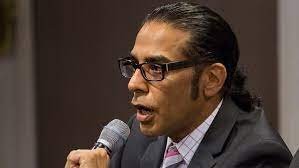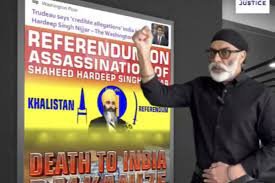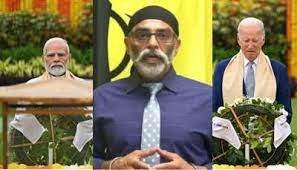An Indian man named Nikhil Gupta was taken into custody for allegedly plotting to kill Khalistani leader Gurpatwant Singh Pannun in the U.S. An undercover U.S. spy and an unidentified Indian government employee were involved in the operation.
It has surfaced that Nikhil Gupta is at the center of a global conspiracy to kill him. The 52-year-old Indian man is seen by the United States as being crucial to a plot to assassinate a Sikh leader in the United States. Gupta, who was detained in the Czech Republic in June, is accused of plotting the murder of an Indian-U.S. citizen. The “target” is an outspoken opponent of the Indian government and supporter of Punjabi separatist activities.
The indictment from the United States Justice Department suggests a murder-for-hire plot aimed against Pannun, the Khalistan Movement’s commander. Blinken said that over the previous few weeks, the United States. had brought up this matter with the Indian government.
U.S. Claims
United States authorities charged Nikhil Gupta with murder-for-hire, in an attempted to kill a Sikh separatist leader in the United States. Gupta was taken into custody in Czechoslovakia after United States Attorney Damian Williams revealed the charges.

“We consider this to be highly important. In recent weeks, several of us have brought up this issue directly with the Indian government. We welcome the government’s announcement today that an investigation is being conducted, and we look forward to the findings,” United States Secretary Blinken was quoted by ANI.
The “target” was not named by the prosecutors, but United States officials have identified him as Gurpatwant Singh Pannun, leader of banned Sikhs For Justice (SFJ) a pro-Khalistan organization advocating for the creation of an independent Sikh state.
An unconfirmed senior field officer in security and intelligence for the Indian government is characterized as adding to the plot’s complexity. This person is said to have recruited Gupta for the murder.
#WATCH | On US Justice Department indicting an Indian national in an alleged foiled assassination plot in US, US Secretary of State, Antony Blinken says, "This is an ongoing legal matter. I can say that this is something we take very seriously. A number of us have raised this… pic.twitter.com/Ac6S6mNBrU
— ANI (@ANI) December 1, 2023
According to United States investigators, the unidentified Indian government employee referred to as CC-1 “agreed in dealings brokered by Gupta” to give the undercover agent $100,000 in exchange for the killing, as reported by AFP. Gupta thought he had the perfect hitman for the job. The ‘hitman’ was actually an undercover United States agent, which he was unaware of.
The Drug Enforcement Administration’s (DEA) administrator, Anne Milgram, stated in the press release that the DEA halted the scheme when a foreign government employee enlisted an international drug trafficker to kill someone in the United States.
The claims coincide with those made by Canadian Prime Minister Justin Trudeau, who claimed that the Indian government and intelligentsia were complicit in the murder of Khalistani rebel Hardeep Singh Nijjar, a resident of British Columbia.
India’s Investigation On U.S. Accusations
The news of the development of a high-level investigation committee examining security concerns raised by the United States during their just finished bilateral meeting was announced by India a while ago.
The charges were announced by United States Attorney Damian Williams publically. “According to the allegations, the accused planned to kill, in the heart of New York City, an Indian-origin U.S. citizen who has openly supported the creation of a sovereign state for the Sikh community, an ethno religious minority in India,” the statement from the defendant read.

United States officials learned of the conspiracy to assassinate Gurpatwant Singh Pannun, who the Indian government had classified as a terrorist under the UAPA.
Despite Canada’s expulsion of a senior Indian diplomat, India replied to the accusation by taking the same action.
In addition to drawing criticism, these events have intensified diplomatic ties.
This instance is similar to one that occurred in Canada, where the death of leader Hardeep Singh Nijjar sparked a diplomatic dispute between Ottawa and New Delhi. In talks with Indian officials, the United States emphasized the seriousness of these accusations and voiced its deep worry over them.
The Indian government will be taking “necessary follow-up action” in response to the inquiry committee’s findings, according to a statement released today by Arindam Bagchi, a spokesman for the ministry of external affairs.
“We have already said that during the course of discussions with the United States on bilateral security cooperation, the United States side shared some inputs pertaining to nexus between organized criminals, gun runners, terrorists and others,” Bagchi said in a press release.
“We had also indicated that India takes such inputs seriously since they impinge on our national security interests as well, and relevant departments were already examining the issue,” said the statement.
According to the MEA, the inquiry committee was established on November 18.
“In this context, it is informed that on 18 November 2023, the Government of India constituted a high-level Enquiry Committee to look into all the relevant aspects of the matter,” the spokeswoman for the MEA stated.
He stated that the “Government of India will take necessary follow-up action based on the findings of the Enquiry Committee”.
Earlier, India had disclosed that during recent meetings on India-U.S. security cooperation, the United States had offered some inputs regarding a “nexus between organized criminals, gun runners, terrorists and others”.
Who is Gurpatwant Singh Pannun?
In November, Gurpatwant Pannun was charged with terrorism and conspiracy after a video he had posted on social media appeared and appeared to threaten passengers flying with Air India, the country’s flag airline.

The White House took Pannun’s case seriously enough, interacting with Indian authorities at the highest levels and expressing “utmost seriousness.” According to Pannun, “the Indian government cannot afford for me to live since he has succeeded in creating a narrative.
They therefore can’t afford for me to survive since I’ve made a name for myself. I am able to dispel the myths about terror and terrorism in India in a democratic, nonviolent manner.”
Reports on the events of 1984–1995 are available from Human Rights Watch, Amnesty International, the US Department of State in 1994, and other organizations.
However, the divisive question of whether Punjab should become an independent nation has never been addressed since 1950 and has yet to be settled amicably and democratically. It was never submitted to a vote or requested of the Punjabi people in 1947, Pannun stated to TIME in an exclusive interview.












Comments 3